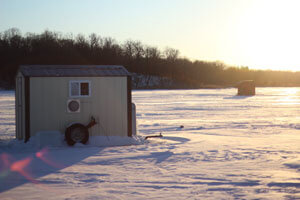Protect against the 'silent killer'
It’s that time of the year again. The lakes are frozen over, snow covers the ground (well, maybe not completely) and winter sports are in full swing. With all the fun that comes with winter there also are dangers and I would like to focus on one in particular. Home owners and hunters/fisherpeople have a common friend and foe: propane heating systems. Friend, in the sense that they have been providing cheap, efficient and clean (compared to coal or wood) heat for many decades. Foe, in the fact that they pose an invisible, costly and sometime fatal danger. (Note: Natural gas is very dangerous as well, but it tends to disperse into the air instead of pooling near a leak.) Both natural gas and propane are odorless, so companies add a chemical called mercaptan (smells like rotten eggs) for safety.
Carbon monoxide (CO) is a product of burning natural gas or propane, and can be deadly if too much is inhaled. If you enjoy fishing and hunting year-round, perhaps you use a portable propane heater or stove. Ever wonder why they warn against using it in a tent? The obvious answer is that it could catch fire, but tents, ice houses or any enclosed structure can become a death trap if there is no or limited ventilation for the odorless, tasteless, invisible gas. Sometimes it shows up as blue smoke, but that’s only coming from a very smoky source.
Some symptoms of low levels of carbon monoxide poisoning are: shortness of breath, mild nausea and headaches. It can often be mistaken as cold, flu or food poisoning symptoms. Moderate levels of CO poisoning symptoms can include: headaches, dizziness, nausea and lightheadedness. High levels of CO exposure can be fatal within minutes.
Carbon monoxide detectors come in a wide range of styles and prices. Some are battery operated and portable. At least one in your home is recommended, but having more than one, especially if many appliances burn fossil fuels, can be as or more valuable than a smoke detector. Most carbon monoxide detectors are good for 5-7 years and should be replaced at that time.
With proper ventilation and recognizing the warning signs of CO poisoning, you can have a fun, safe, and healthy winter! I am much more confident with my husband sitting in the spear house for hours knowing that he has taken the proper precautions to eliminate his risk of CO poisoning. I am happy, and he, is too, as the northerns are visiting often!
